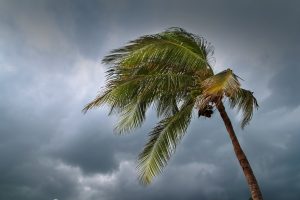Vanuatu declared a state of emergency on Friday, March 3, as it battled its second major cyclone in a week, bringing significant rain and forceful winds. The twin cyclones brought into view the growing reality faced by Pacific Island nations in the face of climate change.
Reuters reported that Cyclone Kevin, a category four storm, had brought gale force winds and torrential rain to the island, less than a week after the capital Port Villa was forced to evacuate some of its residents after it was hit by Cyclone Judy. The nation, spread across 13 principal islands in the southwest Pacific, suffered downed powerlines and damage to roads.
Cyclone Kevin brought gusts of over 230 km (142 miles) per hour, according to the metrology department. The storm passed over Port Villa on Friday and was expected to weaken as it moved away from the islands.
To make matters more precarious, Friday saw the island of Espiritu Santo rocked by twin earthquakes as residents began to clean up Cyclone Judy’s damage. The first, a magnitude 6.5 earthquake, struck around 90 km from the city of Luganville on at 5 a.m. on Friday morning, while a second 5.4 magnitude tremor was felt at 6.30 a.m.
The island of 40,000 residents reported no casualties, but communication with some areas is often imprecise and the situation remains unclear. However, so far, no major damage has been recorded.
On Friday, Prime Minister Ishmael Kalsakau announced a state of emergency. “After the aerial assessment reports and evaluations on the ground, we will be able to declare the disaster areas in the places that have been severely damaged,” he said.
French Ambassador to Vanuatu Jean-Baptiste Jeangène Vilmer highlighted the damage in a series of images, as his government sent humanitarian help from nearby Noumea.
Australia also supplied assistance, with Defense Minister Richard Marles confirming that his government will send a rapid assessment team to assess the damage at the request of the Vanuatu government.
“The Australian Defence Force as a part of the whole-of-government effort is coordinating closely with the Pacific family to provide the best support possible to the Ni-Vanuatu people,” Marles said in a statement.
Port Villa based reporter Dan McGarry said that the spirit of “community wellbeing” was noticeable, even amid disaster.
“Vanuatu people have learned through thousands of years of experience to be ready for cyclones,” he told The Diplomat. “[They] think in terms of community wellbeing, sometimes even at the expense of individual happiness and success.”
Nevertheless, he argued that this community generosity was “being tested” in the wake of Judy and Kevin, exacerbated by growing “economic inequality.”
While the more financially comfortable are better suited to riding out such disasters, according to McGarry, vulnerability to the impact of the twin cyclones was most evident in poorer communities, many who live rurally. “The most vulnerable are those living in impromptu housing…they’re the ones who lost their houses and had their belongings destroyed.”
UNICEF’s Eric Durpaire told the ABC that the occurrence of so many disasters in a short period of time was “crazy.”
“Vanuatu is used to natural disasters, but I think this is the first time it has had two cyclones back-to-back,” he told the Australian broadcaster.
Just after midnight Monday, McGarry tweeted that in Port Villa, “Power’s coming back, but slowly.”
These natural disasters come as Vanuatu leads the charge on tackling climate change. Sitting in the Pacific “Ring of Fire,” the island experiences frequent volcanic and seismic activity. And along with the other Pacific islands, Vanuatu faces existential risks due to rising sea levels.
“Climate change remains the single greatest threat to the livelihoods, security and wellbeing of the peoples of the Pacific,” according to a 2018 communique outlined by Pacific Islands Forum.
Former Fijian Defense Minister Inia Seruiratu echoed these sentiments last year when he argued that geopolitical threats to the region were second to the dangers of climate change.
“The single greatest threat to our very existence is […] human-induced climate change. It threatens our very hopes and dreams of prosperity,” he said at the time.
Last week, Vanuatu’s United Nations representative said that 105 states – including Australia – had co-sponsored a bid to have the International Court of Justice rule on the legal obligations that states have to respond to climate change. The U.N. General Assembly vote, which is likely to occur later in the year, would seek a formal opinion from the international legal body on what legal obligations countries have in countering climate change.
Vanuatu’s foreign minister, Jotham Napat, said last week that the recent disasters were another reminder of islands’ increasing vulnerability to extreme weather, which is exacerbated by climate change.
“While severe Cyclone Judy is today showing no mercy on the people of Vanuatu, it is welcome news that countries are committing to co-sponsor Vanuatu’s U.N. Resolution on clarifying international climate obligations,” he said.
However, even if the resolution passes it would not be binding. The initial bid did not have signatures from China or the United States, nor Indo-Pacific powers such as Indonesia or India. Nevertheless, there is hope that this historic bid will help set a strong precedent.
For the people of Vanuatu, the struggles in the aftermath of Cyclones Judy and Kevin are ongoing.
“Medical centers, hospitals, and schools will have been affected. Some children may not be able to go to school for weeks, maybe months,” said Dickinson Tevi, the secretary general of the Vanuatu Red Cross Society.
In the face of a growing climate crisis, it will take all of the renowned resilience of Vanuatu people to face down this threat, long after the cyclones have disappeared.

































